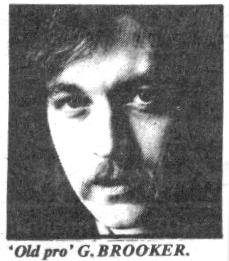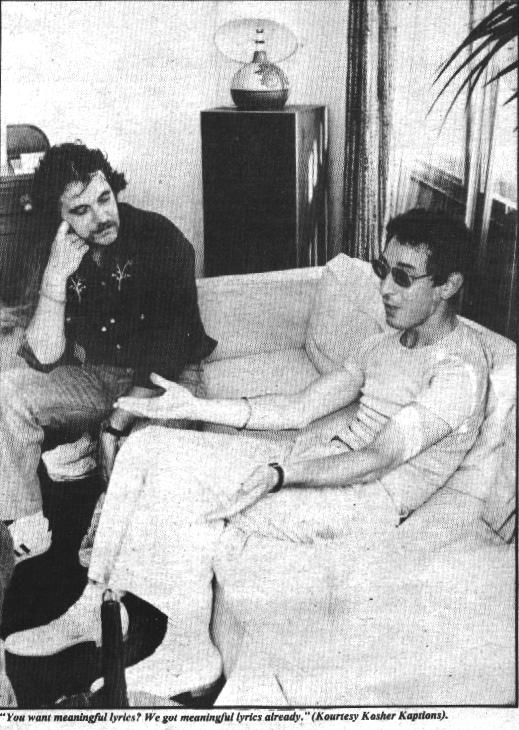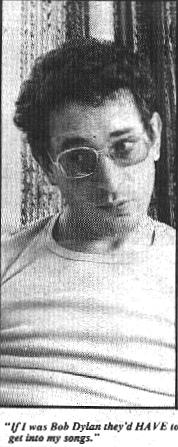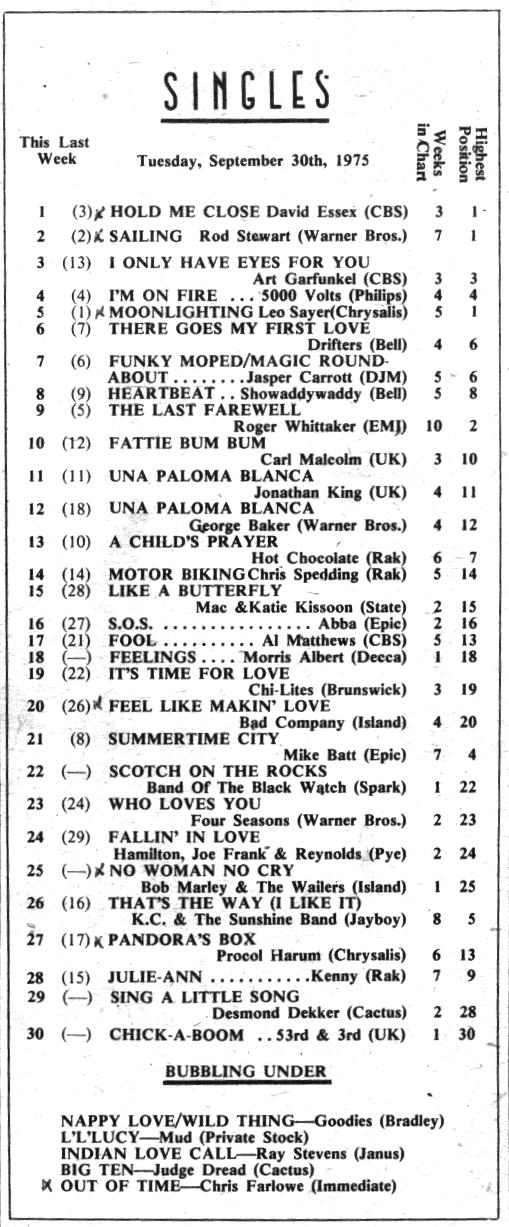
Procol HarumBeyond
|
|
PH on stage | PH on record | PH in print | BtP features | What's new | Interact with BtP | For sale | Site search | Home |
|
These excerpts from New Musical Express, kindly selected for 'Beyond the Pale' by Yan Friis, show Pandora's Box assailing the charts: meanwhile a mocking interviewer draws an unsurprisingly abrasive, if very revealing, performance from its authors; and there are mocking captions, and a mocking teaser.
NME, September 6, 1975
Front page headlines:
Welcome to my armpit: Alice without malice (big pic of Alice Cooper and his armpit)
Garbriel tells why
NME Top 5:
1. ( 1) Sailing, Rod Stewart
2. ( 2) I Can’t Give You Anything (But My Love),
Stylistics
3. ( 3) The Last Farewell, Roger Whittaker
4. ( 4) It’s Been So Long, George McCrae
5. ( 5) That’s The Way (I Like It), KC & The
Sunshine Band
23. (28) Pandora’s Box, Procol Harum
NME albums:
1. ( 5) Atlantic Crossing, Rod Stewart
2. ( 1) Best Of Stylistics, Stylistics
3. ( 6) Thank You Baby, Stylistics
4. ( 2) Horizon, Carpenters
5. ( 4) Venus And Mars, Wings
Pandora’s Box never got a proper single-review, but it was included in the following column
Quick Before They Vanish: Singles overview
by Angio Errigo

(excerpt)
Climbing smoothly is Pandora’s Box by Procol Harum.
This bid for fresh chart success is from the band’s latest
album, Procol’s Ninth, their most carefully tuneful
contribution in some time. A hypnotic theme and Gary Brooker’s
better-than-ever voice should carry the bizarre poetic imagery
that marked the classic Whiter Shade Of Pale into the Top
Ten if it gets enough airplay…
Main single reviews by Andrew Tyler:
Natalie Cole, This Will Be
ABBA, SOS
Souther Hillman Furay Band, Mexico
Billy Ocean, Whose Little Girl Are You
GT Moore and The Reggae Guitars, Reggae Reggae
Main album reviews:
Bruce Springsteen, Born To Run
Lou Reed, Metal Machine Music
Hot Tuna, America’s Choice
NME, September 13, 1975
Front page headlines:
Vocalist’s costume, one owner, seeks new tenant.
Terms negotiable. (big pic of Peter Gabriel in weird Lamb Lies Down costume)
NME Top 5:
1. ( 1) Sailing, Rod Stewart
2. ( 3) The Last Farewell, Roger Whittaker
3. ( 2) I Can’t Give You Anything (But My Love),
Stylistics
4. ( 6) Summertime City, Mike Batt
5. ( 5) That’s The Way (I Like It), KC & The
Sunshine Band
13. (23) Pandora’s Box, Procol Harum
NME albums:
1. ( 1) Atlantic Crossing, Rod Stewart
2. ( 2) Best Of Stylistics, Stylistics
3. ( 4) Horizon, Carpenters
4. ( 6) One Of These Nights, The Eagles
5. ( 3) Thank You Baby, Stylistics
Main single reviews by Ian MacDonald
Bob Marley & The Wailers, No Woman No Cry / Kinky
Reggae (… "it stirs racial memories of both Percy
Sledge and A Whiter Shade Of Pale.")
Wings, Letting Go
Art Garfunkel, I Only Have Eyes For You
David Essex, Hold Me Close
Jefferson Starship, Miracles
Four Seasons, Who Loves You
Paul Simon, Gone At Last
Main album reviews:
Jethro Tull, Minstrel In The Gallery
Johnny Nash, Tears On My Pillow
Mott, Drive On
Allman Brothers Band, Win Lose Or Draw
Budgie, Bandolier
Joe Cocker, Jamaica Say You Will
Reid & Brooker: "We’ve been snookered…"
Vocal Procol: "Well cheesed off."
Pete Erskine hard on the heels of the elusive Harum.
Chrysalis having at last divined a Procol Harum fan on NME a year or two back offered our freshly-arrived Andrew Tyler the chance of an interview with Brooker and Reid. However, as the momentous encounter drew nearer Tyler suddenly backed off into the relative security of a Lookin’ Back.
Likewise, our proposed first encounter – something I felt sure might yield something of interest providing I did a little preparatory homework – was delayed by the sudden onset of psychosomatic diarrhoea in the Erskine person.
Distant impressions of the Procol character seem to be confirmed when it turns out that Brooker has the oppressive, latently homicidal persona of Triple Echo period Oliver Reed – and Reid (Keith, that is) closely approximates an old school friend who once tried to seduce me on a Bournemouth caravan site.
My only solace is that I can truthfully relate that the following actually did take place "high above London’s bustling Oxford Street" and, better still, in "their manager’s office" (replete with the usual beercan / swivel chair props and, most aptly, a punchbag on a spring-mounted stand).
Why the paranoia? Well, I suppose it’s down to appearances; the content of the music (especially Reid’s lyrics) appears intimidatingly weighty, deserving of microscopic analysis but somehow off-putting, cold and uninviting. Brooker appears to be one of those who does not suffer fools gladly. And to him the music press are fools to a man.
Not that they’ve ever really had any bad press.
"In general," says Reid, as Brooker stares disinterestedly at the punchbag, "we’re really praised. But I don’t think I’ve ever read a good review of any of our records. I’ve read people liking our records, or not liking our records, but I’ve never read a piece where someone has sat down and really thought it out."
Maybe it’s that old thing about Procol Harum being 'elusive’.
"Yeah, the first paragraph of every article ever written about us opens with 'It’s difficult…!'" Reid retorts acidly. "Well," he continues, "if it’s difficult you have to try and do it; it’s no use saying 'it is difficult therefore I’m going to ask the same questions’."
"People should try and come to terms with us," says Brooker, "maybe we’re a load of crap. People should at least … it’s as though no one wants to come to terms with us, no one wants to take the trouble to get into us."
"Either it’s 'Procol Harum the underrated group’," says Reid, "which is such a complete bore to read. I mean I can’t stand reading that any more.
"Or it’s 'They’re big in America’."
"We’re not that big in America. We’re as big in ten other bloody countries."
Brooker leans forward. "What’s the expression? Ah yes – we’re 'damned by faint praise’."
Yes. Well there’s nothing about the band that seems to offer any kind of welcome. For a start the lyrics are too imposing.
"Well," says Reid, "I’m a good writer."
Brooker turns to Reid and tells him that he gets up his nose. Reid continues undaunted.
"One of the reasons may be because we’ve never achieved The Big Success. If I was Roger Daltrey this article would be a centre spread. We’ve never achieved the commercial success which warrants a serious look at people."
With the top twenty single success of Pandora’s Box (their first since Conquistador) drawn from their ninth recently-released LP (not surprisingly titled Procol’s Ninth) the position may change. In theory it should force the press into some kind of revaluation of the band. But in actuality it seems unlikely; indeed single charts success often catalyses the converse – an excuse for a plethora of shallow 'taking-care-of-business’ pieces.
The very politeness of the critical greeting bestowed upon Ninth seems to endorse this.
As an outsider, speaking from a position of relative neutrality – enjoying the band live but not sufficiently to ever want to pay either for an album or for any subsequent in-person viewing – Ninth sounds pretty much like any other Procol album, despite the fact that various extra-mural changes were instrumental in its production. Not the least, the hiring of Lieber and Stoller as producers, which gave rise to a rash of reviews propounding that Ninth is a return to the 60s aesthetic represented in Home (the 4th album).

Brooker and Reid don’t see it. Reid searches around for a possible suggestion to the claim.
"Maybe," he begins reflectively, "maybe … the connection is that Home was a very performance-orientated album – and nothing else. It was made with the intention of preparing people for what we’d do on stage.
"Ninth isn’t quite like that, but people’s playing, the individual performances, do come across very strongly. Lieber and Stoller were very performance-conscious."
Brooker elaborates by adding that in both cases Procol used a different producer, different engineer and a different location.
A few people – myself included – reckon that the group’s production on Ninth’s predecessor – Exotic Birds And Fruit – was something of an abortion. Is it why they brought in Lieber and Stoller?
"Personally," Brooker retorts defensively, "I thought it was a brilliant production. But then," he adds, somewhat acidly, "I suppose it’s more a question of what you like – whether it was the right sort of production is open to personal opinion."
The basic raison d'être, it appears, was simple boredom.
Aha! Time for perennial Procol interview head-scratcher; if maintaining a steady position with regard to popularity leads to boredom or loss of drive on the group’s part then How Much Longer For Procol? (Note: this question is partly founded upon two apparently autobiographical Reid lyrics present on Ninth – Without A Doubt, which details the age-old writer’s promise of 'as soon as I get the first paragraph down the rest’ll flow’, and the self-explanatory Typewriter Torment).
Are they autobiographical then, Keith?
"They are. But not in a strictly literal sense; they’re not about me writing, specifically."
But they do give the lie to The Perennial; and perhaps even hint at the suggestion that Mr Reid has higher aspirations.
"I don’t have higher aspirations."
"Subconsciously he has," says Brooker dryly.
"No," rejoins Reid, "definitely not. I have higher aspirations for us as a band, and I have higher aspirations for the work I do with Gary."
"I was asked that question three years ago," says Brooker, annoyed. "People in interviews always assume that things are about to stop with us … they always assume we’re about to break up …
"Speaking personally, with this album I’ve been involved with some of the best players that I’ve ever been involved with who’ve played better on this album that I’ve ever heard them play before."
Which might be another way of saying 'this one’s really representative of the group, man – this one’s really us.’
"Far as I’m concerned," Brooker postscripts, "if this one’s a dud we’ll try another and if that’s a dud I’ll go into production."
In truth I hadn’t really asked when Procol Harum were going to break up. What I did wonder was whether their relatively unchanging position – albeit a fairly high-level one – induced a certain dispiritedness.
"That’s it," says Reid, as if I’d just proved his point, "everybody equates the artistic side with commercial success."
That’s not what I meant.
Brooker observes to no one in particular that he is 'a bit peed off, actually.’ Reid asks him why.
"I’m peed off," he says, slightly pointedly, "with being asked why we’re still going."
"The best way to find out about us," volunteers Reid, "is to talk to the people who like us. Have you ever done that?"
Not really. Have you?
"The people we meet are fanatics and that’s never a representative view. usually when we meet someone it’s because that person battled his or her way backstage – someone who really wants to meet you."
So what kind of interpretations do they put on your lyrics?
"We met an American girl who did Salty Dog for a thesis by using the song and interpreting it in as many ways as she could. Amazing – one of them was a parallel with the sexual act. I had none of those ideas when I wrote it…
"All I had in mind was to write a circular thing. It doesn’t rhyme. There’s not one rhyme in the whole song."
Brooker good-humouredly corrects him: "What about 'a salty dog … the captain’s log [sic]’?" he observes, grinning.
"Home seemed to upset some people from the point of view of atmosphere," he volunteers. "I think there was a lot of very pleasant little tunes on it," he opines cynically, inducing a giggle from Reid, who adds: "The general consensus seems to be that every song’s about death. Categorically I had no idea that every song had a reference to dying in it until people came up to me and said it."
"Right," says Brooker, firmly, "here’s your raison d'être – we’ve never gone the whole hog on anything.
"If we’d been Alice Cooper we’d have given away a skeleton with every copy, with publicity shots of us coming out of the undertakers for a quick snooze on the tombstones …"
"Same with Salty Dog," adds Reid. "Everybody said that was an album about the sea; that was NEVER an album about the sea …"
"The reason for the success of the orchestral Live In Edmonton," Brooker opines, " – the excellence of it aside – was that people knew what they’d be getting: Procol Harum playing with an orchestra. It was very clear, easy for people to relate to …"
But the roots of a Procol standard like The Devil Came From Kansas are all but clear.
"That came about simply because I’ve always liked Randy Newman," Reid explains. "I bought his first album. There was a song on it called The Beehive State… a line about the senator from somewhere or other – I’ve forgotten. That line inspired it." But how are the plebs to know that? How many Procol fans are familiar with the first R Newman album?
Reid says that if his lyrics aren’t easily understood then he accepts a failure in their prime purpose – to communicate. Yet, the current single – in common with another PH standard, the apocryphal Gates Of Cerdes – is pure stream-of-consciousness fantasy inspired purely by the sound of certain combinations of words.
Brooker decides to cut loose from the traditional low profile – and sidestep in the process.
"The people playing in this band are the best people there are," he states categorically in oblique defence. "Every person," he continues dogmatically, "is as good as they can be on their instrument. We all stay together as a group," he adds, "but continually everybody is asked to be part of someone else."
I fail to rise for the bait. It could be a trick. And I hate being laughed at.

"And," he adds, after a pause, "would be making millions of dollars all the time."
The reporter dons his creep-cape. To lighten the atmosphere I tell Brooker that Little Feat’s drummer (himself highly regarded) had told me once that he’d always wanted to meet his hero – Procol’s drummer BJ Wilson.
"As it happens," Brooker returns with satisfaction, "Richard Hayward once roadied for us …"
"And so did that other whipper-snapper … what’s his name??"
"Jeff Baxter," says Reid obligingly. Reid then nudges Brooker.
"Well, tell him," he goads Brooker, like a proud parent urging the offspring to reveal his 'O' level certificates to an uninterested relative.
"Alright," Brooker concedes. "Bob Dylan asked BJ to play with him, Mick (Grabham, their guitarist, formerly of Cochise) was asked to join Elton John’s band … and I … I was asked to join the Rolling Stones."
"Yeah," says Reid. "They asked him to come and do their albums with them."
"You think we’re joking, don’t you?" says Brooker tauntingly.
Once again I’m not sure.
"Look," says Reid, observing my bewilderment. "Before we go I’ll give you an example of what we were talking about earlier – about people not bothering to examine what we do …
"Take a song like Toujours L’Amour; there’s a line – 'the cord they knotted to keep us apart’…
"Now what do you think that means – 'the cord they knotted to keep us apart’?"
The umbilical cord?
"Exactly! Now if someone had bothered to think about it they would have seen that it was all very simple…
"But then, nobody ever does."
NME, September 20, 1975:
NME Top 5:
1. ( 1) Sailing, Rod Stewart
2. ( 6) Moonlighting, Leo Sayer
3. ( 2) The Last Farewell, Roger Whittaker
4. (14) I’m On Fire, 5000 Volts
5. ( 4) Summertime City, Mike Batt
15. (13) Pandora’s Box, Procol Harum
NME albums:
1. ( 1) Atlantic Crossing, Rod Stewart
2. ( 2) Best Of Stylistics, Stylistics
3. ( 3) Horizon, Carpenters
4. ( 8) The Very Best Of Roger Whittaker, Roger Whittaker
5. ( 7) Cat Stevens’s Greatest Hits, Cat Stevens
NME, September 27, 1975:
NME Top 5:
1. ( 2) Moonlighting, Leo Sayer
2. ( 1) Sailing, Rod Stewart
3. (16) Hold Me Close, David Essex
4. ( 4) I’m On Fire, 5000 Volts
5. ( 3) The Last Farewell, Roger Whittaker
17. (15) Pandora’s Box, Procol Harum
NME albums:
1. ( 1) Atlantic Crossing, Rod Stewart
2. ( 2) Best Of Stylistics, Stylistics
3. (16) Wish You Were Here, Pink Floyd
4. ( 5) Greatest Hits, Cat Stevens
5. ( 4) The Very Best Of, Roger Whittaker

NME, October 4, 1975:
NME Top 5:
1. ( 3) Hold Me Close, David Essex
2. ( 2) Sailing, Rod Stewart
3. (13) I Only Have Eyes For You, Art Garfunkel
4. ( 4) I’m On Fire, 5000 Volts
5. ( 1) Moonlighting, Leo Sayer
27. (17) Pandora’s Box, Procol Harum
And that was the last week ever that Procol Harum had a hit-single or hit-album in either Britain or the US.
NME albums:
1. ( 1) Atlantic Crossing, Rod Stewart
2. ( 3) Wish You Were Here, Pink Floyd
3. ( 2) Best Of Stylistics, Stylistics
4. ( 5) The Very Best Of, Roger Whittaker
5. ( 4) Greatest Hits, Cat Stevens
NME, October 11, 1975
News pages
Rest of the news in brief
(excerpt)
Procol Harum are to play a series of concert and college dates in late November. They are still being finalised and the only confirmed gig is at Southampton University on November 28.
NME, October 25, 1975
Teazers
(excerpt)
… New York papers advertising upcoming "dance" featuring Alex Harvey, Little Feat and Procol Harum – how do you dance to Procol Harum?…
The Mammoth Task: Yan's extracts from the first 52 weeks of Procol press in the NME |
Swimming Against the Tide: Yan's extracts from the remaining ten years of Procol press in the NME |
PH on stage | PH on record | PH in print | BtP features | What's new | Interact with BtP | For sale | Site search | Home |